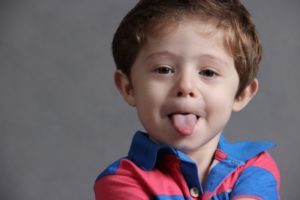Therapy Programs for Children and Adults
- Tongue Thrust
- Speech Sound Disorders (Articulation)
- Language Development (including Late Talkers)
- Apraxia
- Brain Injury
- Executive Functioning
- Fluency
- Social Skills
- Autism
- Emotional Recognition and Regulation (particularly for ADHD and ASD clients)
- Aural Rehabilitation
- Accent Reduction
- Voice Disorders
Tongue Thrust
- …the tongue pushes forward during a swallow.
- …may or may not be evident in speech (i.e. “th” for “s” sounds).
- …untreated can push teeth out of alignment, even undoing orthodontia work.
Speech Sound Disorders
- …is not pronouncing sounds correctly.
- …may involve substitutions, distortions, or omissions of speech sounds.
Language Development
- …has difficulty communicating basic wants and needs.

- …has difficulty following directions.
- …has difficulty with grammar, vocabulary, and/or making sentences.
Late Talker
- …is not using words by 18 months.
- …is not pointing or gesturing to communicate by 1 year.
Apraxia
- …know what they want to say, but have impaired ability to plan the movements needed for correct speech.
- …message from their brain to their mouth is disrupted.
- …may have Childhood Apraxia of Speech (CAS) or acquire apraxia later in life after some kind of brain trauma.
Brain Injury
- …acquired and traumatic brain injuries.
- …deficits with attention, memory, reasoning, and/or executive functions.
Executive Functioning
- …has trouble planning or predicting future events
- ….struggles with time management
- ….difficulties organizing thoughts, schedules, etc.
- …unable to properly sequence events, etc.
- …demonstrates repetitions or prolongations of words/word parts.
- …blinks eyes, taps feet, or tenses during moments of stuttering.
Social Skills
- …has difficulty taking turns in conversation or staying on topic.
- …has difficulty picking up social cues such as facial expressions, etc.
- …has difficulty interacting and playing appropriately with others.
Aural Rehabilitation
- …training to improve the speech, language, and listening abilities of those with hearing loss.
Voice
- …problems with pitch, volume, intonation, respiration or resonance disorders.

